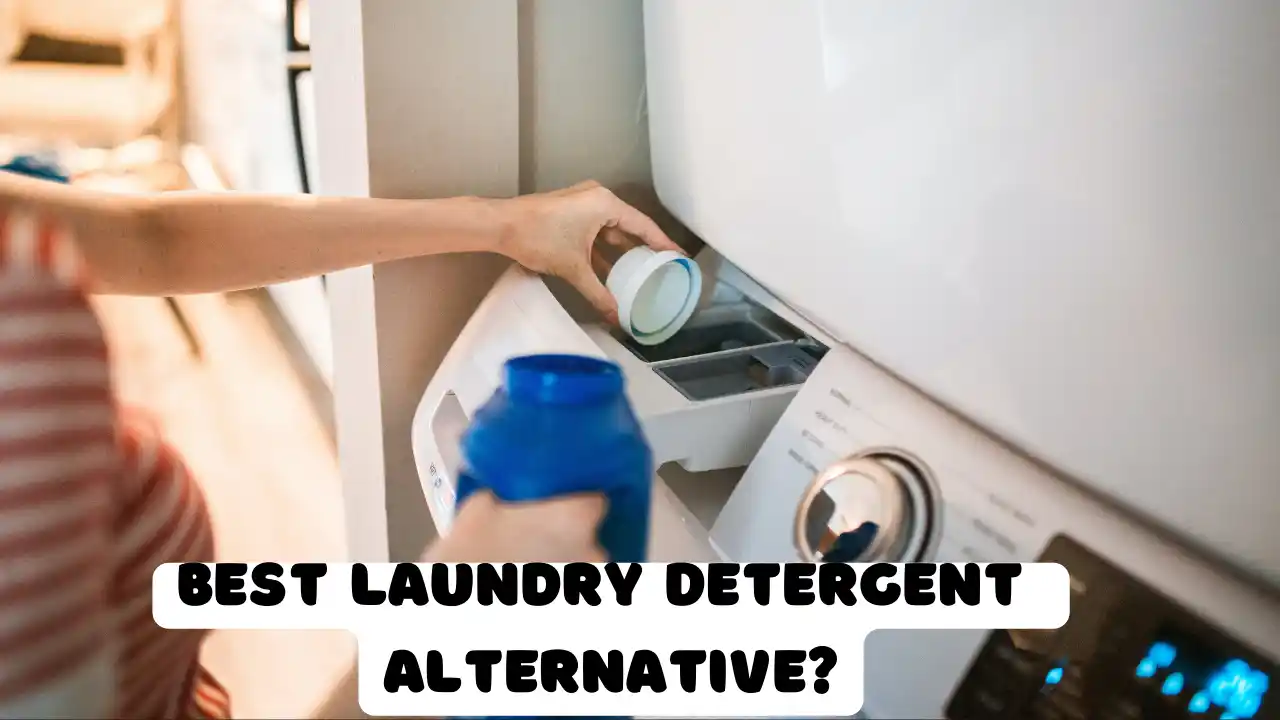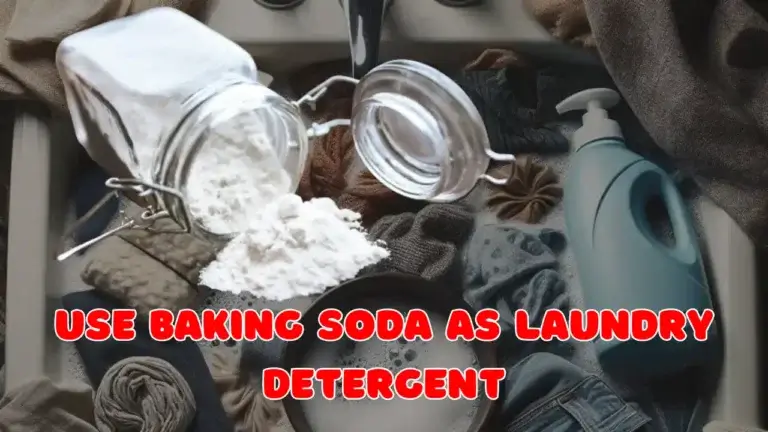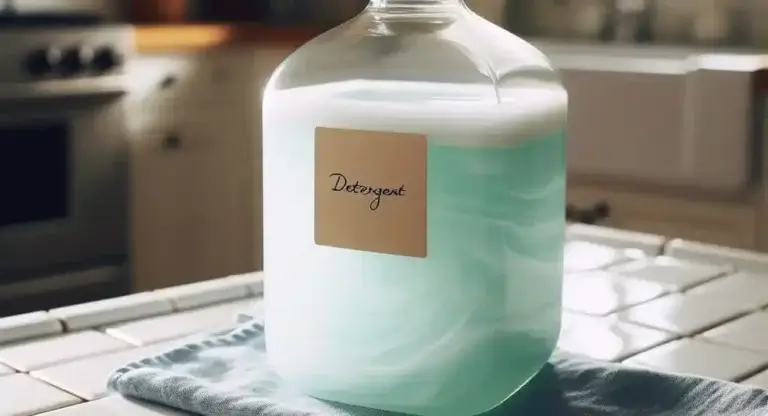Best Laundry Detergent Alternative When You’ve Run Out – Exploring List of Alternative to Laundry Detergent
Have you ever found yourself standing in front of your washing machine with a load of dirty clothes, only to discover that you’ve run out of laundry detergent? It’s an annoyance many homeowners face from time to time when life gets busy. But there’s no need to postpone doing laundry or make an emergency run to the store. You likely already have effective alternatives on hand.
In this comprehensive guide, we’ll cover homemade and store-bought substitutes you can use as the best laundry detergent alternative to wash clothes when you don’t have traditional liquid or powder detergent.
Table of Contents
Why It’s Important to Clean Clothes Properly
Before we dive into the best DIY and store-bought detergent alternatives, let’s review why it’s important to properly clean your laundry in the first place:
- Remove stains & soils – From food to mud to sweat, clothes get all kinds of stains and soils on them that need to be dissolved and rinsed away. Using an effective cleaning agent helps lift these away.
- Eliminate odors – Bacteria growing on dirty clothes cause unpleasant odors. Laundry detergent helps kill bacteria and make clothes smell fresh again.
- Sanitize fabrics – Hot water and detergent work together to sanitize fabrics and remove allergen triggers like pollen, dust mites, and pet dander.
- Extend the lifespan of clothes – Over time, letting stains, soils, and bacteria accumulate can degrade fabrics. Keeping them clean preserves your clothing investment.
- Avoid damage to skin/health – Soils, bacteria and residue left on clothes can irritate skin, aggravate allergies, and spread germs that make you sick.
Now that you understand why it’s important not to skip washing clothes without detergent, let’s look at homemade and store-bought solutions.
Best Laundry Detergent Alternative – 5 Options
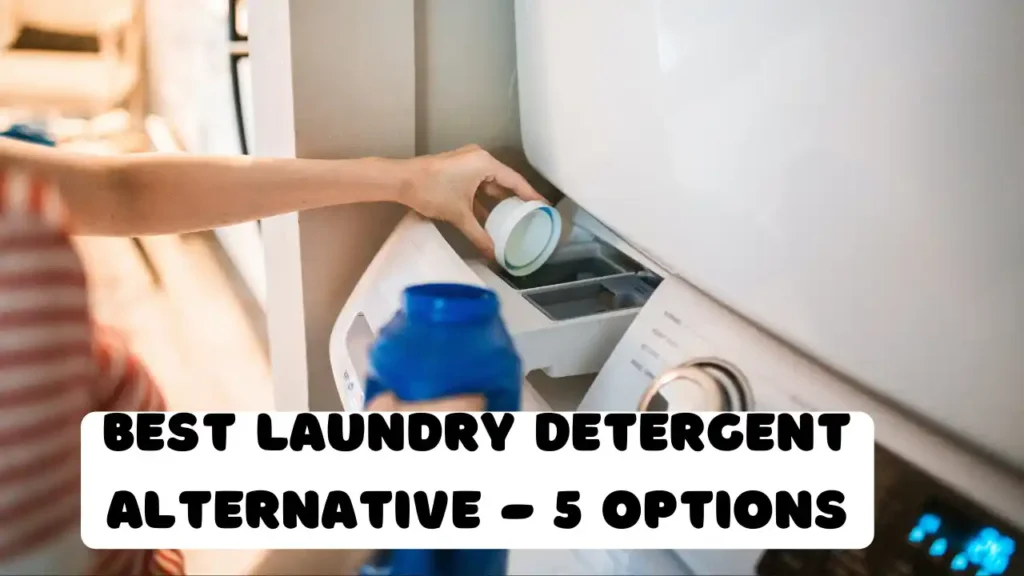
Tired of harsh chemicals, lingering fragrances, and mountains of plastic packaging cluttering your laundry room? It’s time to ditch the conventional and embrace the power of natural, effective laundry detergent alternatives! Whether you’re driven by environmental concerns, sensitive skin, or simply the desire for clean clothes without the downsides, there’s a perfect plant-powered solution waiting for you. So, buckle up as we explore the top detergent alternatives, each tailored to specific needs:
The Dynamic Duo: Baking Soda and Vinegar
This dynamic duo reigns supreme for their versatility and effectiveness. Baking soda tackles odors and stains like a champ, making it ideal for sweaty gym clothes and stinky towels. Meanwhile, vinegar softens clothes, brightens colors, and acts as a natural fabric softener. Simply add half a cup of each to your wash cycle for an eco-friendly cleaning powerhouse!
The Gentle Giant: Castile Soap
Made from plant oils, castile soap is the gentle giant of the bunch. It’s kind to skin and fabrics, making it the perfect choice for delicate and baby clothes. Grate a bar and place it in a muslin bag for a mess-free wash, or dilute liquid castile soap for direct use.
The Oxygen Powerhouse: Hydrogen Peroxide
Need to tackle tough stains and brighten whites without the harshness of chlorine? Hydrogen peroxide is your knight in shining armor. This natural bleaching agent packs a punch against stubborn stains, leaving your clothes sparkling clean. Add a half cup to your wash cycle for stain-busting magic.
The Suave Star: Borax
Don’t let the name fool you – borax is a mineral compound that gently boosts cleaning power and softens hard water. It’s a great all-rounder but use it sparingly and with caution, as it can be irritating to sensitive skin.
The DIY Delight: Homemade Laundry Detergent
Unleash your inner alchemist and whip up your own customized laundry detergent! Explore online recipes and find the perfect blend of natural ingredients like soap flakes, washing soda, and essential oils to match your needs and preferences.
Bonus Tips for Eco-Conscious Champions:
- Pre-treat stains: Tackle tough stains with natural solutions like baking soda paste or lemon juice before washing.
- Embrace cool cycles: Opt for cooler water temperatures to save energy and protect delicate fabrics.
- Clean your machine: Regularly run a hot water cycle with vinegar to remove detergent buildup and odors.
- Minimalism is key: Use less detergent than recommended by conventional brands.
Remember, small changes in your laundry routine can make a big difference for the environment and your well-being. Embrace the power of natural alternatives, ditch the chemicals, and enjoy clean, soft clothes and a happy planet!
Homemade Laundry Detergent Alternatives From Your Pantry
Chances are you have several items in your kitchen right now that can act as effective DIY laundry detergent in a pinch. Give these homemade detergent substitute options a try:
Baking Soda
Baking soda is mild enough for delicate fabrics yet strong enough to scrub away soils and stains. Here’s how to use it:
- Add 1⁄2 cup baking soda to the wash basin along with the clothes
- Or sprinkle it directly on stained/soiled areas of clothing
- Wash as normal on the desired setting
The alkaline composition of baking soda helps lift soils and stains without the need for harsh chemicals. It’s safe for all washable fabrics.
Lemon Juice
The acidic nature of lemon makes it a natural stain remover and cleaning agent. To use lemon juice as a laundry booster:
- Squeeze fresh juice from lemons onto stained/dirty areas of clothing
- Let sit 5-10 minutes before washing as usual
- You can also add 1 cup of lemon juice to wash the water
The citric acid works to dissolve residue, brighten whites, and sanitize fabrics. It’s gentle enough for most washable materials.
White Vinegar
Like lemon, vinegar is an acidic product that cuts through residue, removes stains, and kills bacteria. Here’s how to use it:
- Add 1-2 cups vinegar to the wash basin before adding the clothes
- Or apply it directly onto stained/smelly areas of clothing
- Wash as normal
The acetic acid in vinegar dissolves soils, kills odors, and acts as a natural fabric softener. It’s generally safe for most washable fabrics.
Castile Soap
Made from plant oils, Castile soap effectively washes away dirt and soils from clothing. Here’s how to use it:
- Grate a bar of Castile soap into flakes
- Add 2-3 tablespoons flakes per load
- Wash as normal
The surfactants in the soap lift stains and residue without harsh chemicals. It works well in all water temperatures.
Washing Soda
An alkaline salt, washing soda helps remove oils, residue, and stains from fabric. Here’s how to use it:
- Add 1⁄4-1⁄2 cup to wash water along with clothes
- Apply the paste directly on stained areas, and let sit 30 minutes
- Wash as usual
Washing soda cuts through all kinds of soils and stains without the use of bleach or other harsh solvents. It’s generally safe for most colorfast washable fabrics.
Homemade laundry solutions with pantry staples like lemon, vinegar, baking soda, and washing soda make great substitutes when you’re out of detergent.
Store-Bought Detergent Alternatives You May Already Have
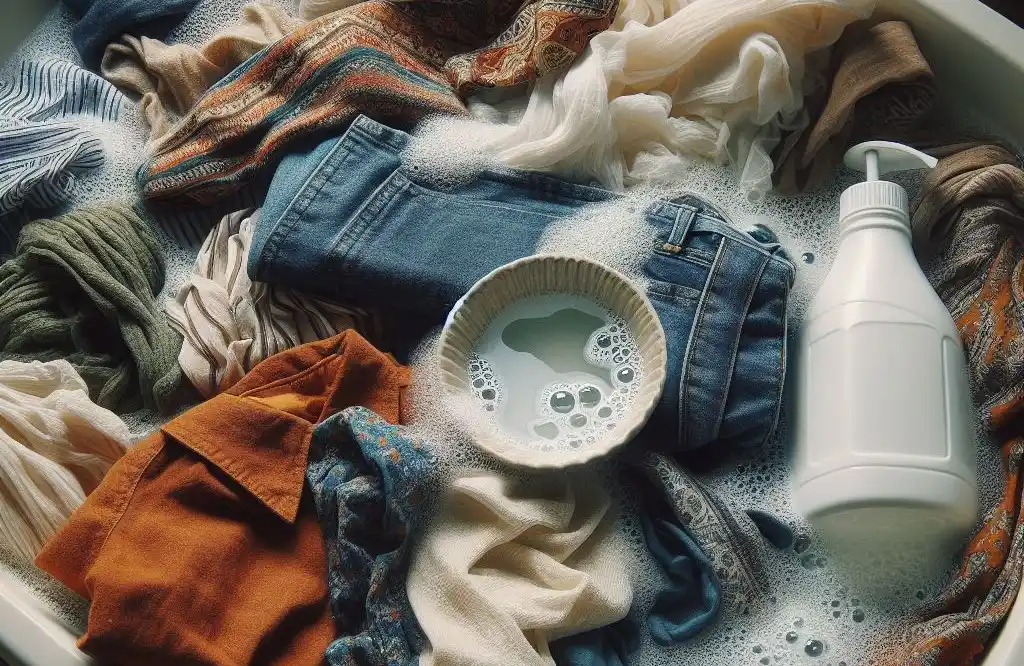
In addition to homemade alternatives probably sitting in your kitchen, check your bathroom because you may already own effective laundry cleaning substitutes. Consider using these options:
Liquid Hand Soap or Body Wash
The surfactants that allow liquid hand soap and body wash to create lather and foam up also do the same with laundry. Here’s how to use them:
- Add 2-4 tablespoons (more for heavily soiled loads) at the start of the wash cycle
- Wash as normal
Both typically contain gentle cleansing agents that will effectively wash regular laundry loads without issues.
Shampoo
It may sound odd, but the surfactants in shampoo that wash hair and scalp can also wash laundry loads when you don’t have detergent. Here’s how to use it:
- Add 1⁄4-1⁄2 cup shampoo at the start of the wash cycle
- Use a gentle formula for delicates
- Wash as normal
The soap molecules in shampoos like those found in laundry detergent lift away dirt, body oils, and residue from clothing with ease.
Dish Soap
Many people don’t realize that dish soap actually contains powerful degreasing agents perfect for cutting through food stains on clothing. Here’s how to use it:
- Add 2-4 tablespoons to the wash basin before adding the clothes
- Spot treat extra-greasy stains beforehand
- Wash as usual
The grease-fighting power in dish soap tackles food and oily stains with ease. It works in all water temperatures.
Dishwasher Pods
That’s right – those convenient dissolvable soap pods for your dishwasher also work as a laundry detergent alternative.
- Simply throw 1-2 pods in with your dirty clothes at the start of the wash cycle depending on size of the load
- Wash as normal
The powerful cleaning agents dissolve away all kinds of kitchen soil, so they work wonders in the washing machine too.
Keep in mind liquid dish soap tends to be the better option for handwashing delicates and smaller laundry loads. But the convenience of pods can’t be beat!
FAQs: Laundry Detergent Alternative
We’ve covered a variety of effective homemade and store-bought substitutions you likely already have on hand for doing laundry when you don’t have detergent.
Here are answers to some frequently asked questions about using laundry detergent alternatives:
How much baking soda or vinegar should I use?
- For a top-loading machine, add 1⁄2 cup baking soda or 1-2 cups vinegar
- For front-loading HE washers, start with 1⁄4 cup baking soda or 1 cup vinegar
- Adjust amounts based on load size and soil level
What temperature should I wash clothes without laundry detergent?
- Hot water (130°F+) boosts the cleaning power of homemade alternatives
- But lower temps like Warm (80-110°F) still work decently well
Can I really use shampoo or dish soap?
- Yes – the soap molecules and degreasers in them lift stains/soils similar to laundry detergent
- Just avoid conditioning or antibacterial formulas
How do I know if clothes are fully cleaned?
- Inspect for stains/soils after washing without detergent
- Rewash using detergent alternative again if needed
- Switch back to regular detergent for heavily soiled items
Is it OK to dry clothes washed without detergent?
- Yes, but heat can set in any remaining stains/oils
- Use laundry alternatives sparingly to avoid buildup issues
When to Avoid Laundry Detergent Alternatives
While the homemade and store-bought substitutions in this article make serviceable alternatives, here a few instances when it’s best to avoid them:
- Heavily soiled items – Homemade alternatives may not fully wash grease/oil stains without detergent boosters, so inspect washed items carefully before drying
- Delicates/specialty fabrics – Some materials like wool, silk or spandex have special wash requirements, so skip alternatives and use gentle detergent
- Those with sensitive skin – Vinegar, baking soda, and lemon can cause skin irritation for those with sensitivities, especially if residue remains
- When clothes require sanitizing – Only high heat + detergent can fully sanitize, which is critical for some work uniforms, athlete’s gear, hospital scrubs, etc.
For these situations, take the time to get proper laundry detergent or take clothes to a laundromat rather than using an alternative. The small added effort helps ensure clothes get fully cleaned without damage or skin issues.
Conclusion
As you can see, just because you’ve run out of laundry detergent doesn’t mean you need to stop washing dirty clothes. Tap into the powerful cleaning capabilities of pantry staples like baking soda, lemon, and vinegar. Or use soap and shampoo already in your bathroom. There are plenty of effective alternatives you likely already have on hand.
Next time you find yourself detergent-less when facing a pile of dirty clothes, use one of the homemade or store-bought solutions outlined here to hold you over until you can restock. Avoid them only for heavily soiled and delicate items requiring sanitizing cycles.
Hope this guide gives you the confidence to tackle laundry even when traditional detergent runs out! Let us know which substitute worked best for you.

